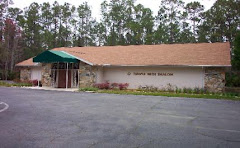Adolf Hitler was a fan of the Passion Play at Oberammergau, which he praised for its convincing portrayal of the "menace of Jewry," although it is interesting that the character Hitler finds most admirable in the Passion Play is not Jesus, but Pilate. In 2004 in the wake of Mel Gibson’s movie, a Jew offered the world an apology on behalf of all Jews, living and dead, expressing "profound remorse" for killing “the Savior of Man.”
Why is the story of the Passion or Death of Jesus so important today? We all arrive in the first decade of the 21st century carrying a good deal of baggage, full of articles that we recognize and some articles we do not recognize and of which we are, perhaps, not very proud.
Understanding the nature of that “baggage” is the purpose of a course being taught at Temple Beth Shalom by Rabbi Merrill Shapiro on Wednesday morning June 4th, 11th and 18th from 11 a.m. until 12 noon. All are welcome to attend, participate and react to the material, the stories of the Gospel accounts of Jesus’ last hours from the Gospel accounts themselves. The course, entitlted “A Rabbi Reads the Gospels: The Accounts of the Death of Jesus of Nazareth” is aimed at fostering the beginning of understanding of the two thousand year history of often troubled relations between Christians and Jews.
Deicide is the killing of a god. In the context of Christianity, deicide refers to theresponsibility for the death of Jesus. The accusation of Jews in deicide has been the most powerful warrant for antisemitism by Christians. Though not part of Roman Catholic dogma, many Christians, including members of the clergy, held the Jewish people under aantisemitic cannard to be collectively responsibile for killing Jesus. According to this interpretation, both the Jews present at Jesus’ death and the Jewish people collectively and for all time had committed the sin of deicide, or God-killing. This charge of deicide and all direct and indirect antisemitism was ruled wrong by the Second Vatican Council in 1962 and most Christians have followed suit since.
According to Ohio State University Profesor Jeremy Cohen, "[e]ven before the Gospels appeared, the apostle Paul (or, more probably, one of his disciples) portrayed the Jews as Christ's killers. But though the Christian Scripture clearly looks to the Jews as responsible for the death of Jesus, Paul and the evangelists did not yet condemn all Jews, by the very fact of their Jewishness, as murderers of God and his messiah. That condemnation, however, was soon to come."
Recall the words of the "golden-tongued" St. John Chrysostom (344-407 A.D.), which were uttered not among a small gathering of learned clerics, but were flung from the pulpit in Antioch for all Christians to hear, both there in that heavily Jewish city, and also reverberating through all the subsequent centuries of Christian antisemitic preaching. He thundered that Jews are the "most miserable of all men . . . . lustful, rapacious, greedy, perfidious bandits. . . . inveterate murderers, destroyers, men possessed by the devil. . . .whom debauchery and drunkenness have given them the manners of the pig and the lusty goat. They know only one thing, to satisfy their gullets, get drunk, to kill and maim one another. . . . they have surpassed the ferocity of wild beasts, for they murder their offspring and immolate them to the devil." As to Judaism, symbolized by the synagogue, it is "an assembly of criminals . . . a den of thieves . . . a cavern of devils, an abyss of perdition . . . . far from venerating the synagogue because of the books it contains, hold it in hatred and aversion for the same reason. . . . hate the synagogue precisely because it has the law and prophets. I hate the Jews also because they outrage the law" (Migne, PG, 38, 843-942).
Friday, May 23, 2008
A Rabbi Reads the Gospels Meets June 4th, 11th and 18th
Labels:
Gospel,
Jesus,
Passion,
Rabbi Merrill Shapiro
Subscribe to:
Post Comments (Atom)

No comments:
Post a Comment